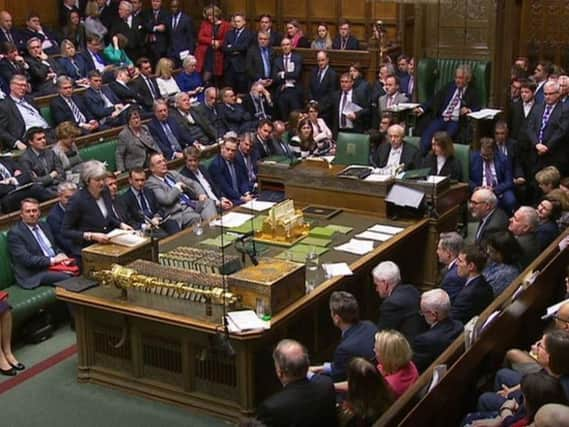MPs move to seize control of Brexit amid Commons chaos


Parliament once again rejected a no-deal Brexit after chaotic scenes in which Labour’s Yvette Cooper hijacked a vote, enabling the House to strengthen its position on the issue.
During a day of tense debate, MPs called on the Prime Minister to bring forward a series of votes on the options before them, having this week rejected her negotiated deal for a second time.
Advertisement
Hide AdAdvertisement
Hide AdLeeds Central MP and chairman of the Brexit Committee Hilary Benn led the effort, with the release of an emergency report setting out how Parliament could take control of the process.
In a statement he said: “After another historic defeat for the Prime Minister, the UK will now have to apply for an extension to Article 50.
“The extension will need to be of sufficient length to allow Parliament to reach agreement on a proposal that it is prepared to support. The clock has now been run down to the point where there is no alternative left given that leaving with no deal cannot be the policy of any responsible Government.
“Parliament must now be given the chance to hold a series of indicative votes as quickly as possible or else we will not find out what there might be support for as an alternative to the Prime Minister’s deal which has now been rejected twice by large majorities.”
Advertisement
Hide AdAdvertisement
Hide AdSpeaking ahead of the vote, Normanton, Castleford and Pontefract MP Ms Cooper also demanded that the Commons get a say over the way forward.
She said: “There are two big failings underlying what the Government has done - the Prime Minister has never sought consensus and never sought to build agreement... She has deliberately sought a political declaration which simply fudges the future and never gives us clarity.
“We need clarity and we need consensus and that is why we should have a series of indicative votes.”
MPs will tomorrow vote on whether to delay Brexit by extending Article 50.
Advertisement
Hide AdAdvertisement
Hide AdBut Ms Cooper said: “That has to be an extension for a purpose. It cannot simply be for more of the same - the Prime Minister going back to Brussels and saying the same things about changing the backstop and the same discussions that we have had many times before.”
Speaking after last night’s vote, Labour leader Jeremy Corbyn said his party would now reach out across the House of Commons to try and secure a compromise solution.
He told MPs: “Parliament must now take control of the situation.
“In the days that follow… myself, the Shadow Brexit Secretary and others will have meetings with members across the House to find a compromise solution that can command support in the House. This means doing what the Prime Minister failed to do two years ago in searching for a consensus on the way forward.”
Advertisement
Hide AdAdvertisement
Hide AdHe added: “Labour has set out a credible alternative plan. Honourable members across this House are coming forward with proposals - whether that is for a permanent customs union, a public vote, Norway plus or other ideas.”
Confronting Mrs May in the Commons, Wakefield MP Mary Creagh asked: “When will the Government allow this House to express any alternatives to the deal that the Prime Minister despite having been beaten twice is still trying to railroad through this place?”
A Downing Street spokesman last night dismissed the idea of putting forward a series of indicative votes, suggesting that the Prime Minister would instead have a third try at getting her Withdrawal Agreement, with legal assurances over the Irish backstop agreed with the EU this week, through the Commons.
He said: “What you have seen in Parliament in recent weeks is a series of plans being put before Parliament by opposition parties and they have all been rejected.”